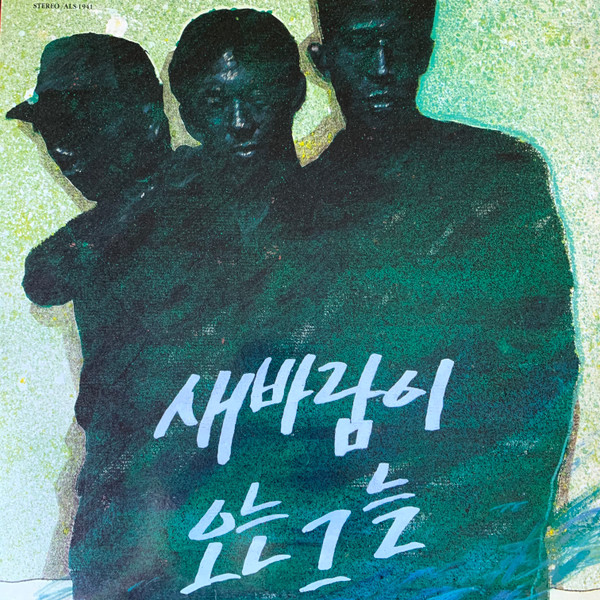
Charming, breezy, and wonderfully multi-layered, those are a few of the many adjectives one can use to describe the sole work by Korean art folk trio: 새바람이 오는 그늘 (who I’ll refer to as “The Shade With New Wind from now on). On their debut, 1990’s 1집, one can hear another defined turning point in Korean pop’s shift from largely traditionally-influenced balladry into exploring more independent sounds and ideas that drew from realms of disparate folk traditions, contemporary art, and modern technology. For such an album full of various kinds of forward-thinking ideas, one wouldn’t expect it to sound so cozy.
The Shade With New Wind (새바람이 오는 그늘) has its roots in a late ‘80s Korean independent culture that grew from the more liberal explorations from the university music scene. Before Cho Kyu Chan would go on to be a huge heavy in the Korean alternative music charts, somewhere in Seoul’s Dongguk University he was trying to strike up some form of direction.

Son to two successful musicians, Cho Kyu Chan, could have followed in the footsteps of his composer father and his singing mom but his first pursuits took him into the world of poetry and painting.With time, after the passing of his father in middle school, he’d use music as an outlet to express himself. In 1989, Cho would set aside his stagefright to enter and win his first prestigious songwriting contest. It was off in university where, in between studies and late-night hangs, he’d pick up a guitar and perform a few songs with friends Lee Joon (이준) and Kim Jong Ryul (김정렬) stoking the idea that he just might have some musical talent.
Self-taught in a way, Cho’s early songs showed his preternatural gift for music. He had grown up with the soul music from America and the jazz music flowing through commercial radio stations. So too, would Japanese and Brazilian records come into his headspace filling up what would be Cho’s early influences.
As the then nameless trio built on those early songs of his (influenced by a maturing of ideas), friends and family who’d turn up to listen urged them to record those songs. There was something special in those songs. Somehow, a demo of embryonic songs got to Seoul-based record label, Asia Records, and the group now had studio time to make a statement.
In the album liner notes, the trio speak of being influenced by memories of summer’s passed by. Recorded in early autumn, they wanted to imbue their songs with warmth of that leftover seasonal breeze and this new more contemplative time. Although, the album would be begin with acoustic folk jazz, its first “complete” song (“새바람이 오는 그늘 (The Shade With New Wind)”) pared down that kind of personal music to even bare essences, singing of blue melodies with barely-there musical broad strokes perfect for the album’s atmosphere. In it we get to hear Cho’s first gorgeous vocals, a hybrid mix of soul, jazz, and bossanova, with silky phrasing that could sweep the listener away.

1집 would cover a vast amount of territory. Single, “좋은 날 (Good Day)” would display a love of country music and cocktail jazz. Then as soon as it was over, they’d jump into the quiet, moody Beatles-esque balladry of “그냥 (Just)”. Rather than pigeonhole themselves, songs like “소풍 가는 날 (Picnic Day)” showed all these impressive seams – were they art rockers or newfound fusion poppers?
For every jazz-minded “빨강머리 작은 새 (A Little Redhead Bird)” there was an overtly pop “언제나 그렇듯 (As Always)”. “사진첩 (Photo Album)” showed they could easily express Chon’s heartwrenching K-Soul music but should that force the group to ignore their atmospheric ambient ideas, as they would in the breathtaking “겨울 (Winter)”?
Such is the naivety of youth, that 새바람이 오는 그늘 (The Shade With New Wind) stood for more than just a change in musical winds, it stood for a quiet contemplation of a new decade with vast new possibilities for Korean artists just like them. Whatever new styles and ideas they tried, the trio had no need to reconcile them, this was the promise of a new era.

Although the trio would dissolve just a year later – due to their military service responsibilities – this album, rightfully, remains a hidden gem of a record for untold future Korean singer songwriters who heard something inspiring in their autumnal swan song. One hopes it speaks to others outside the mainland (as it spoke to me this day).
